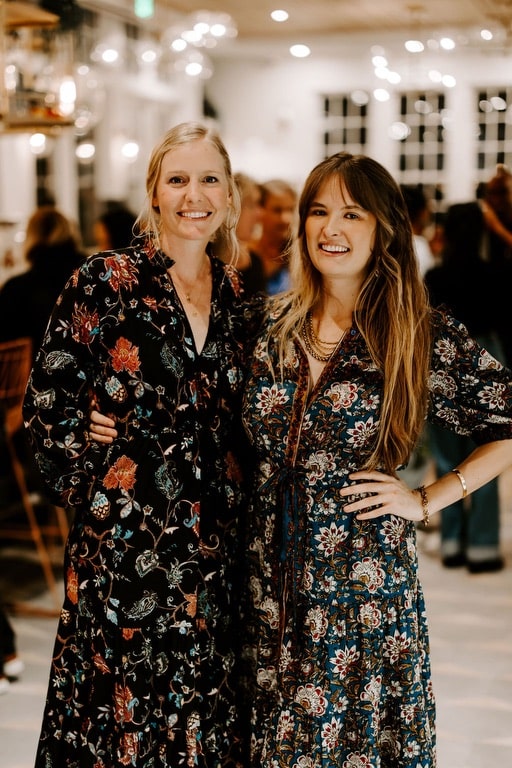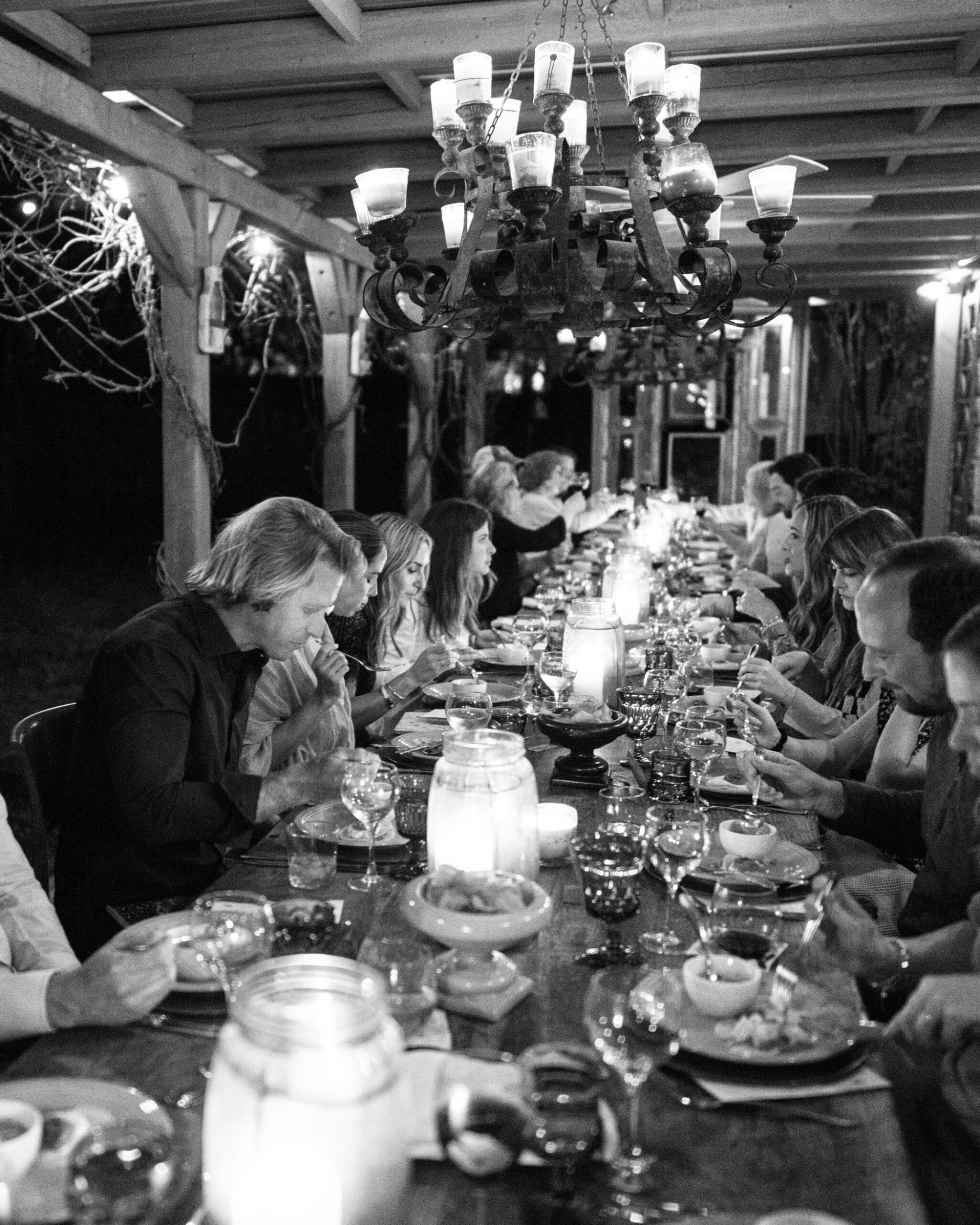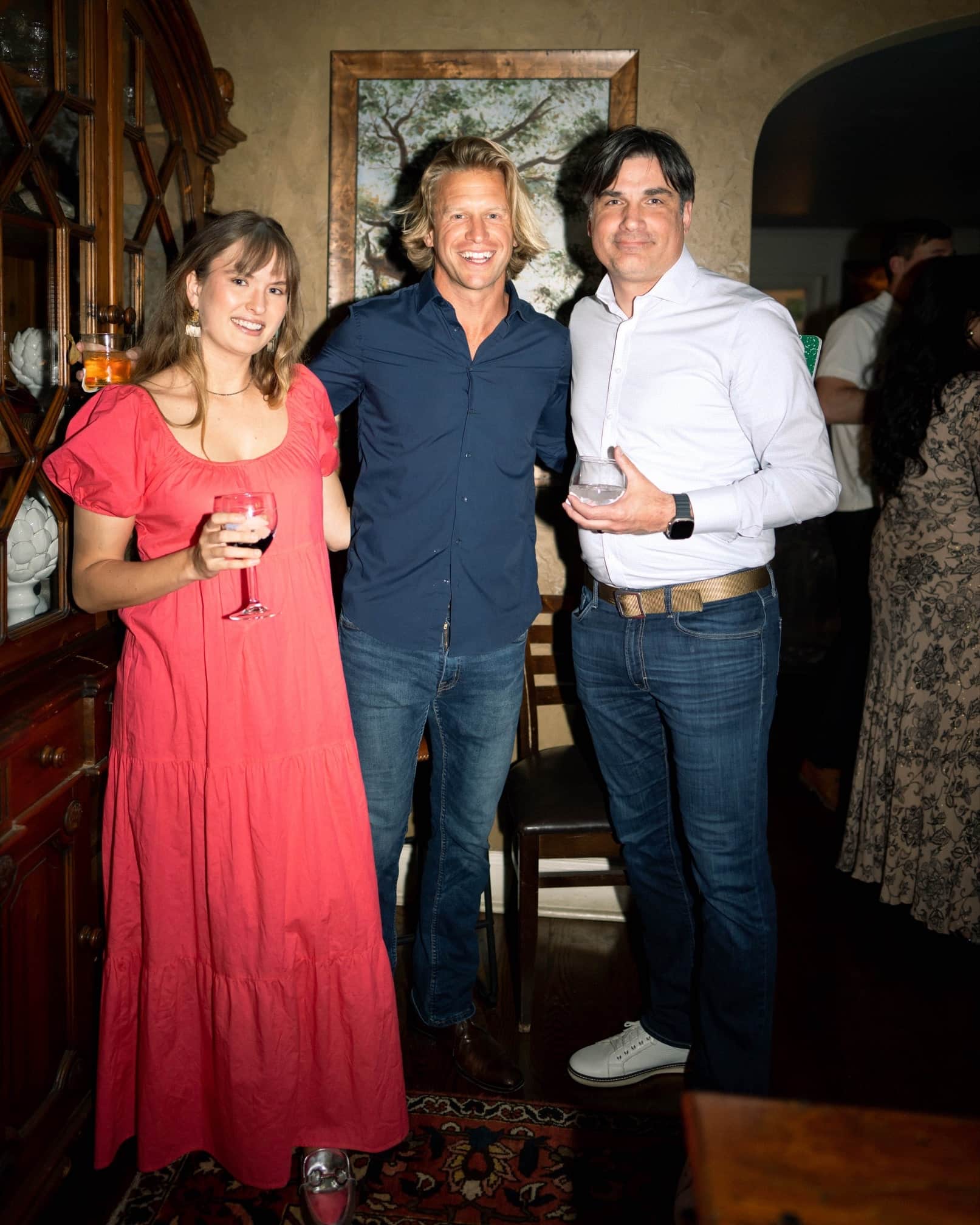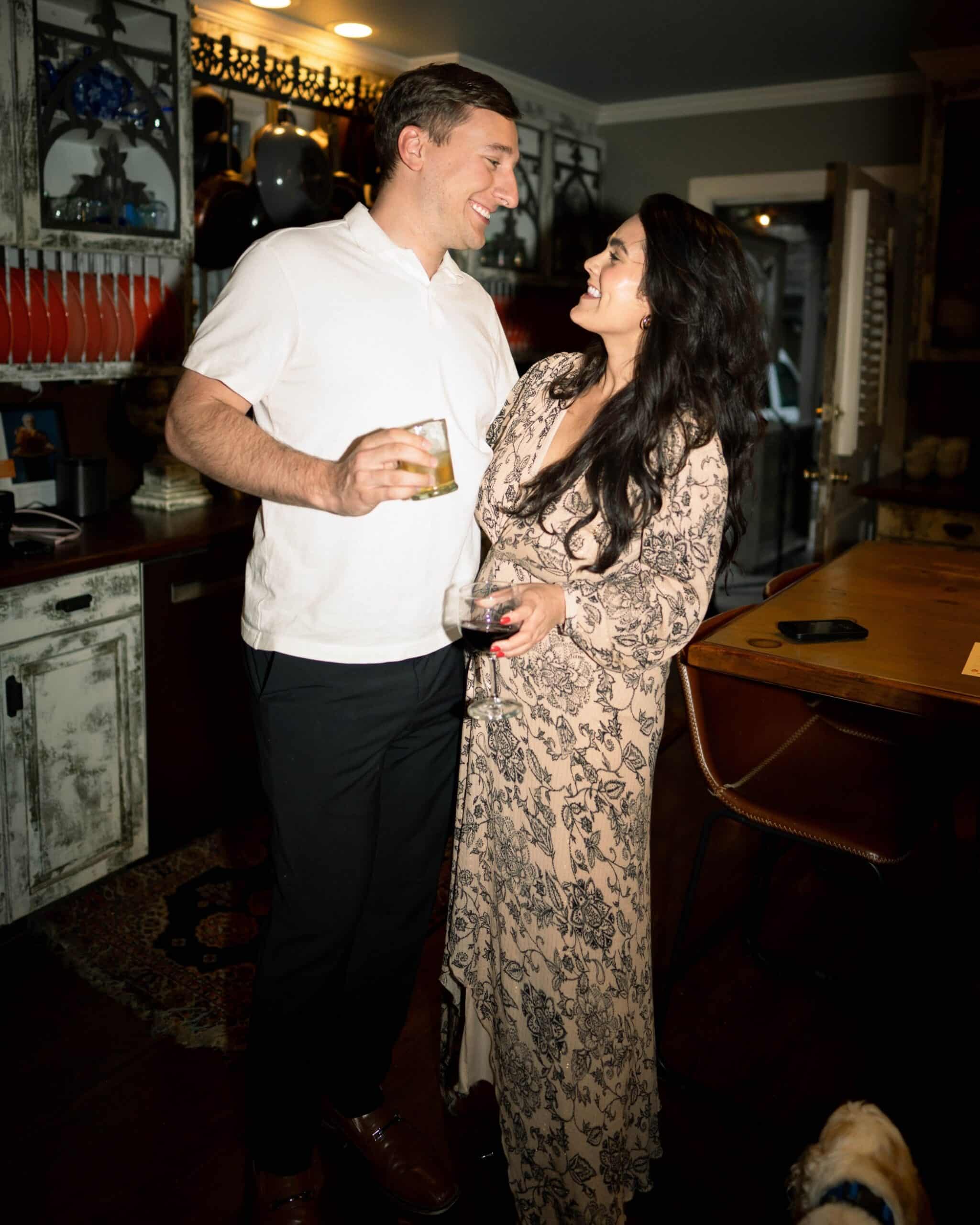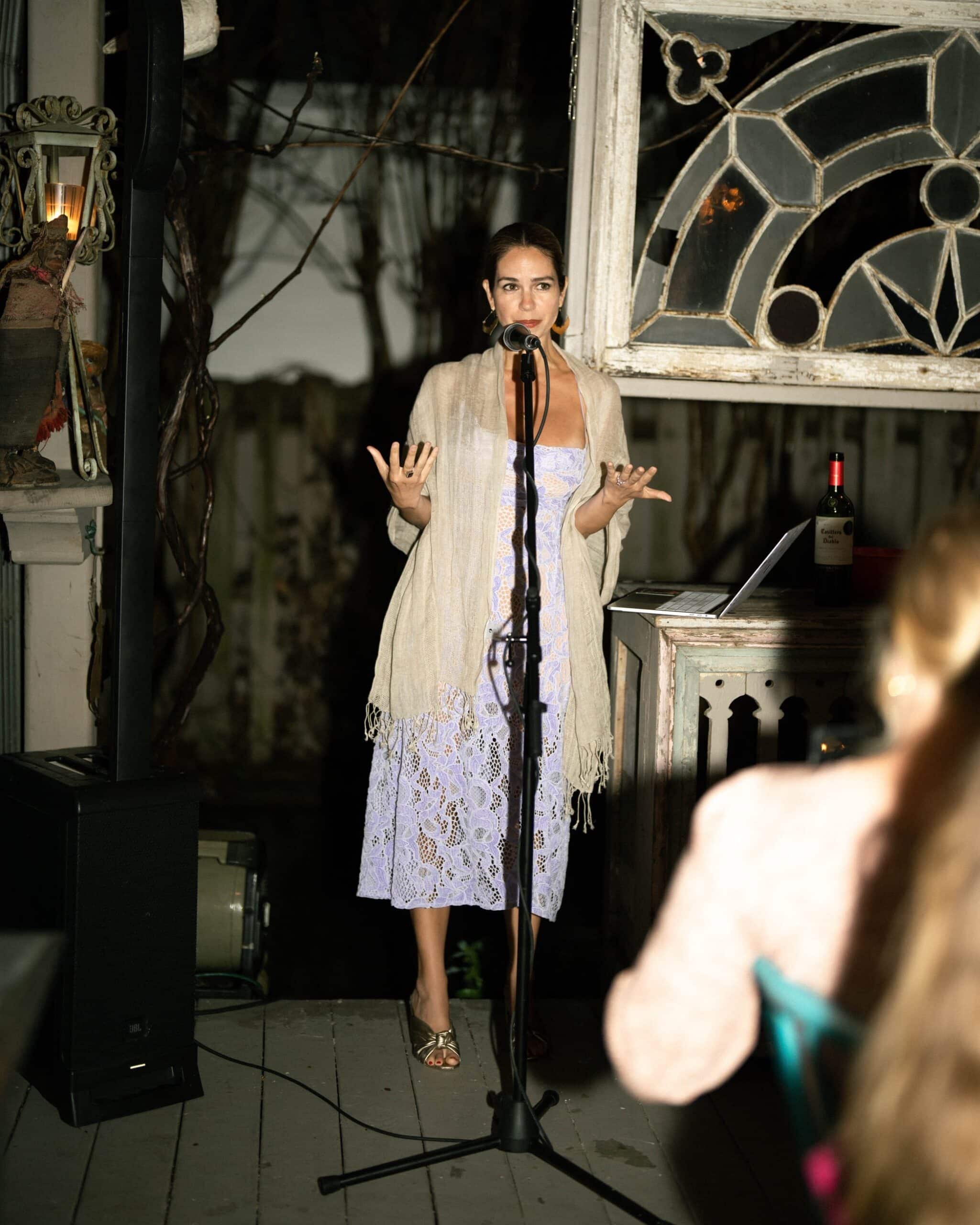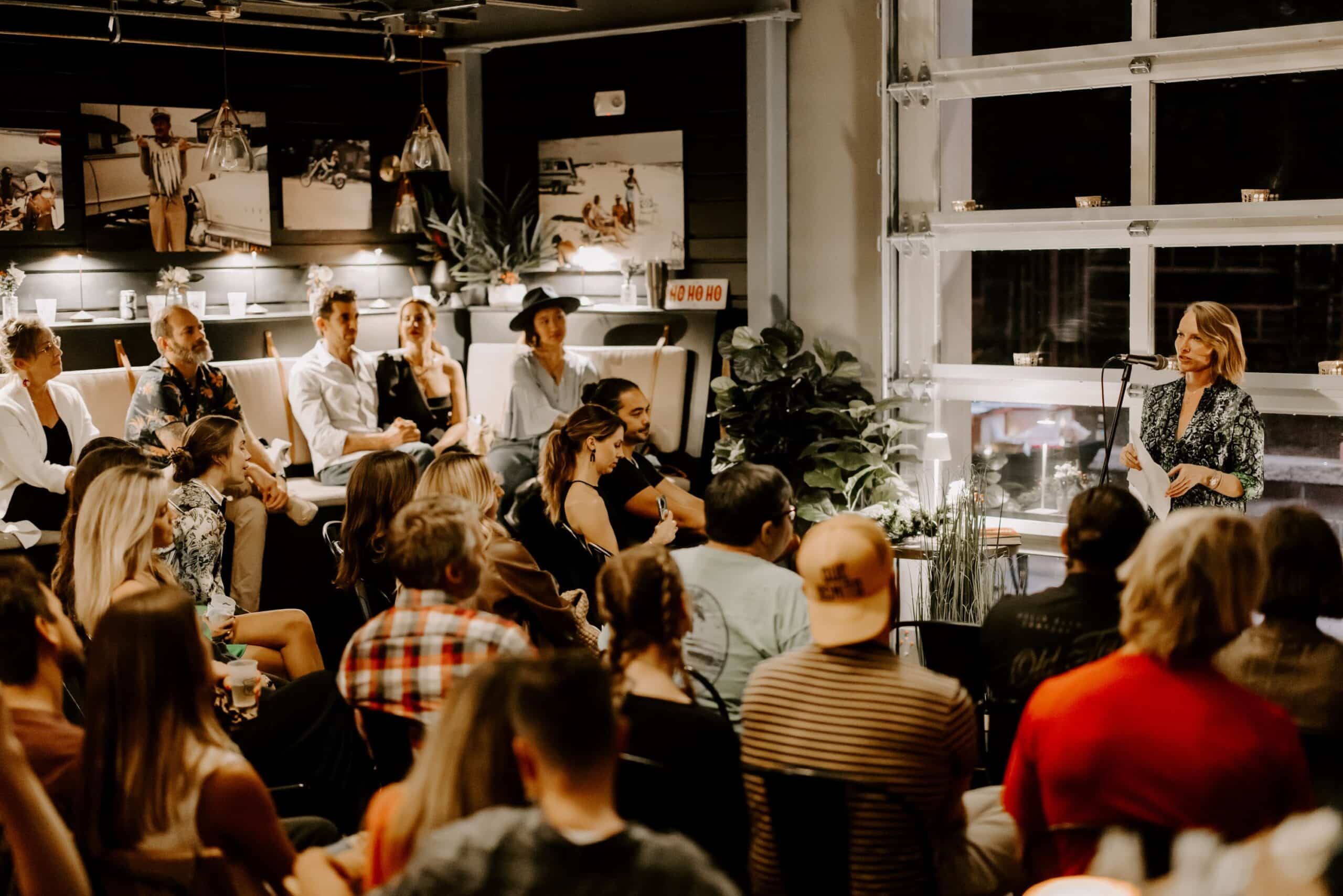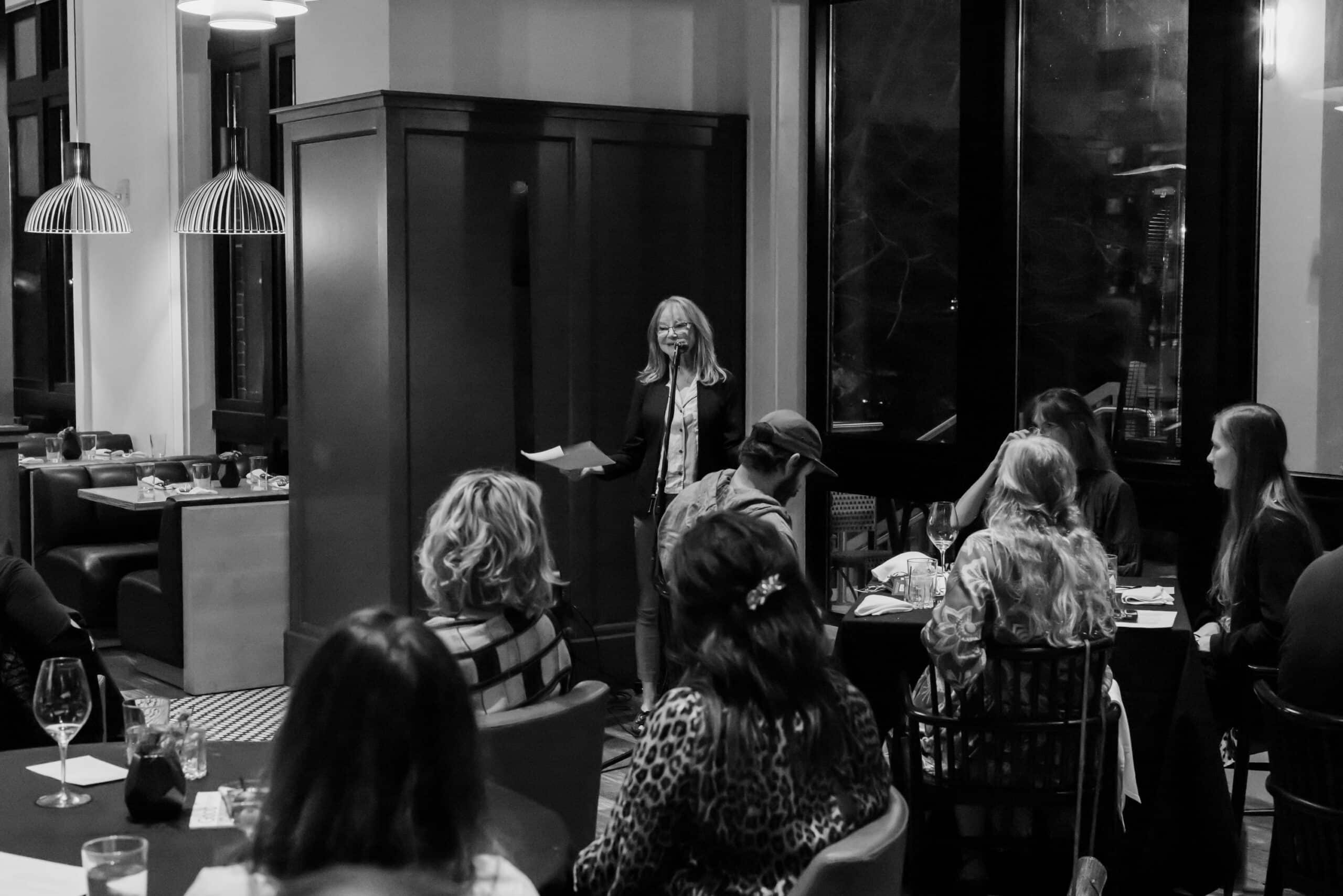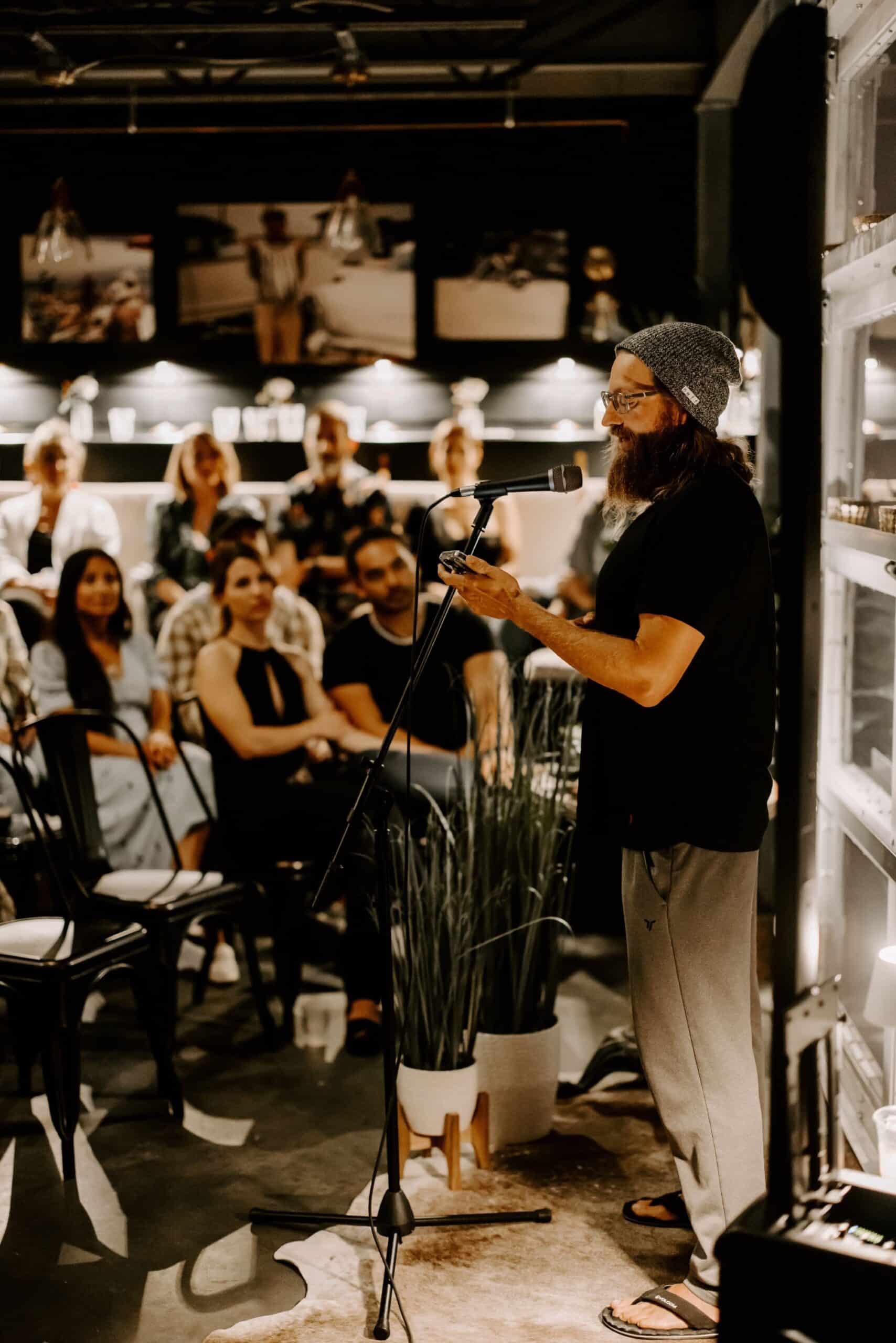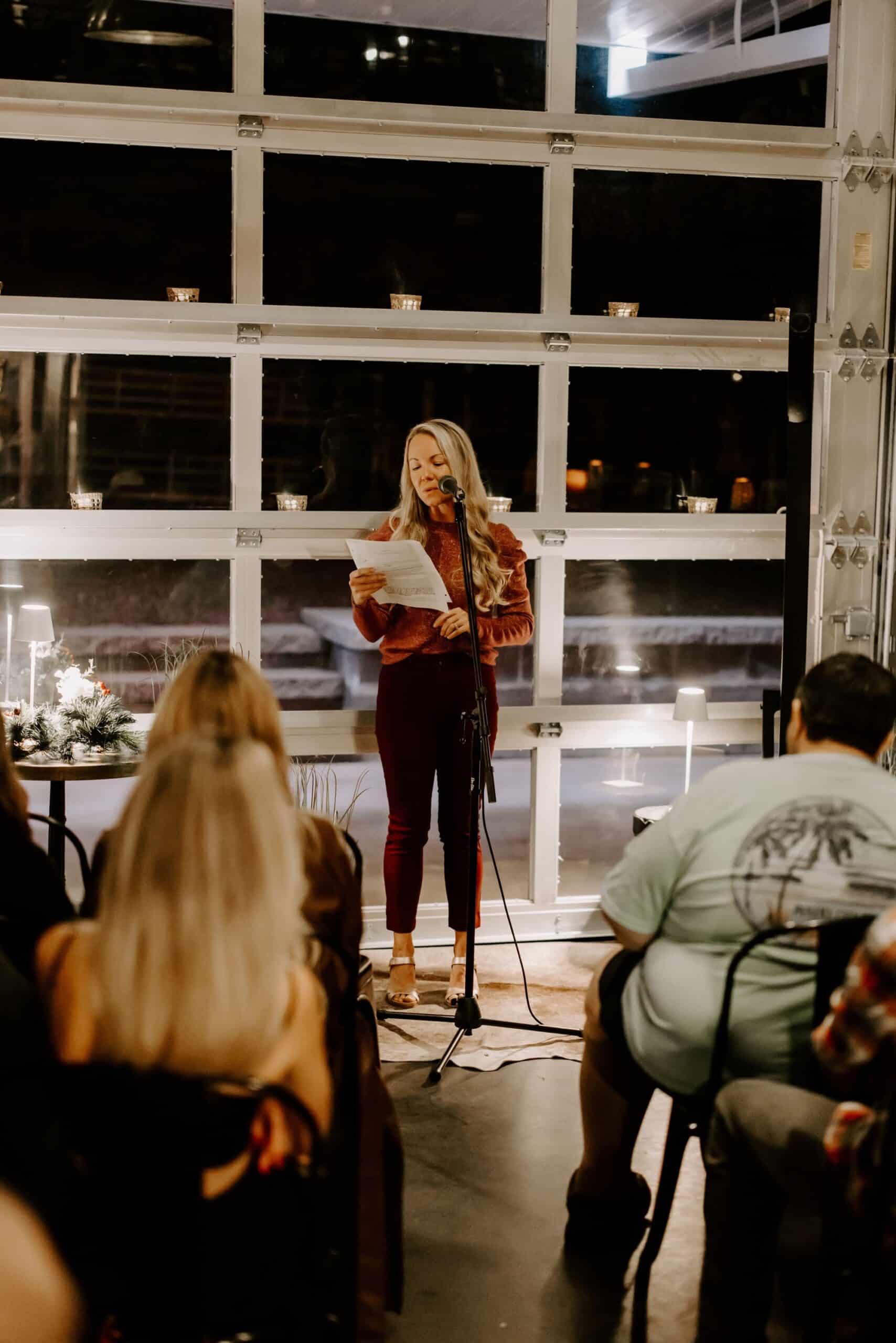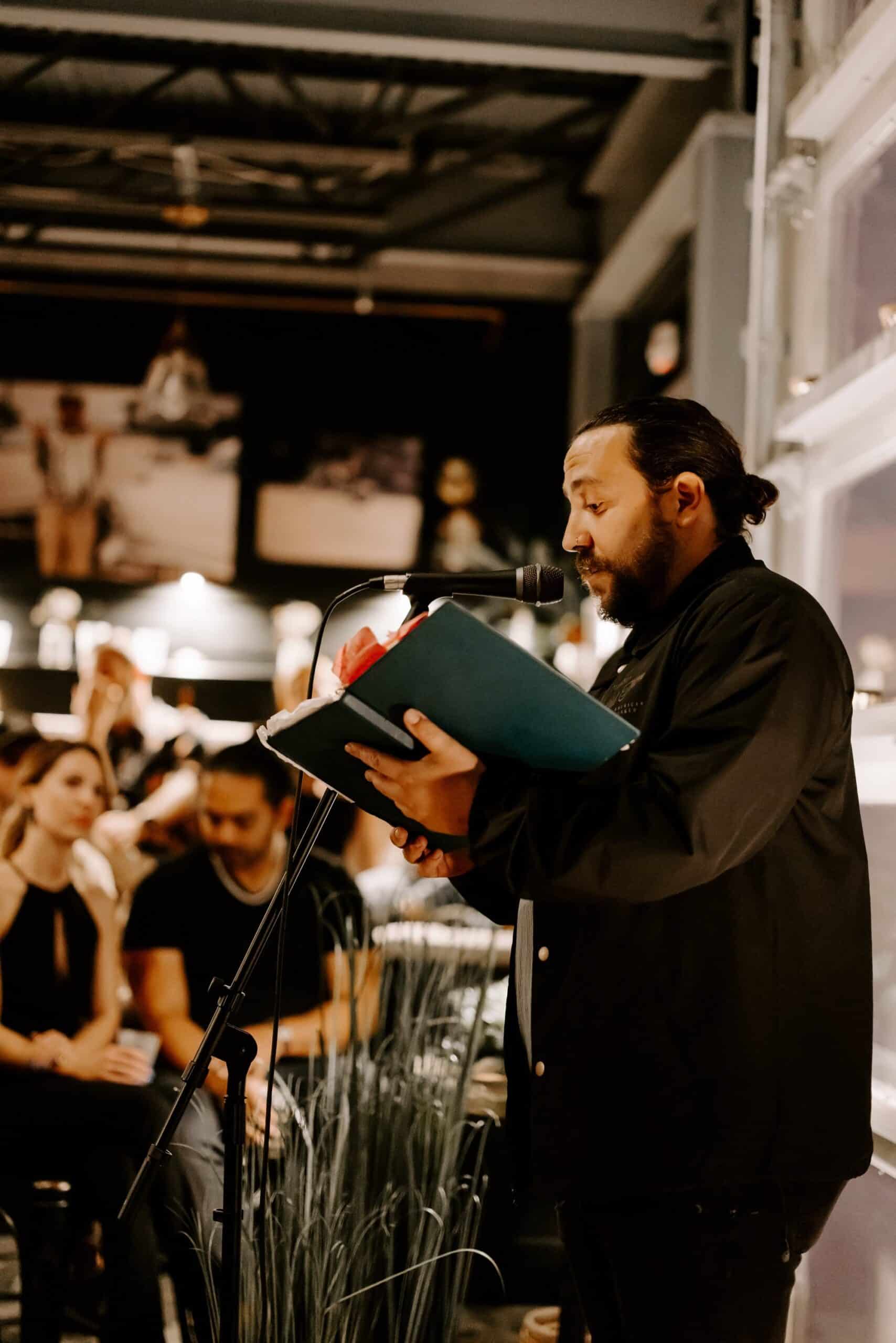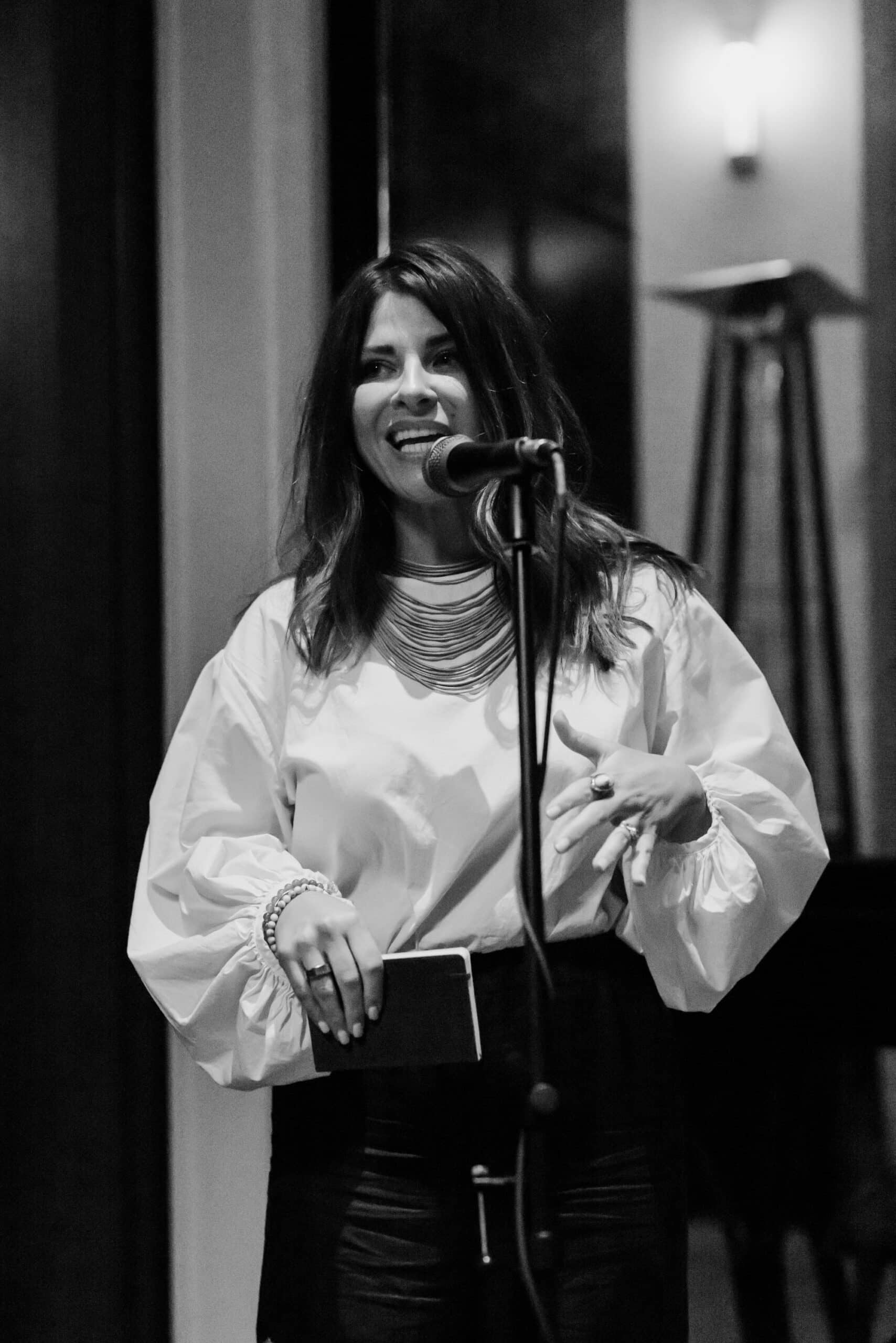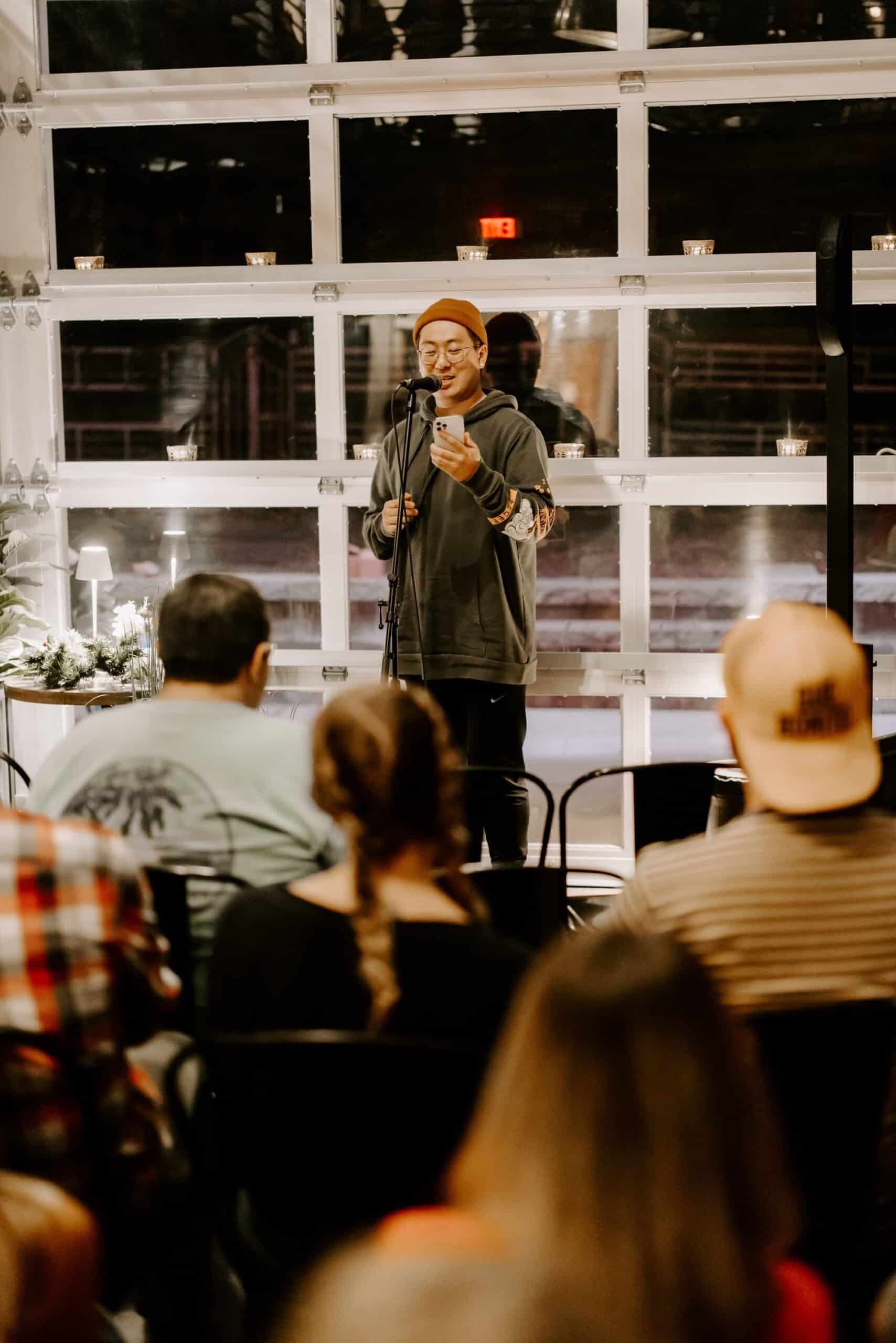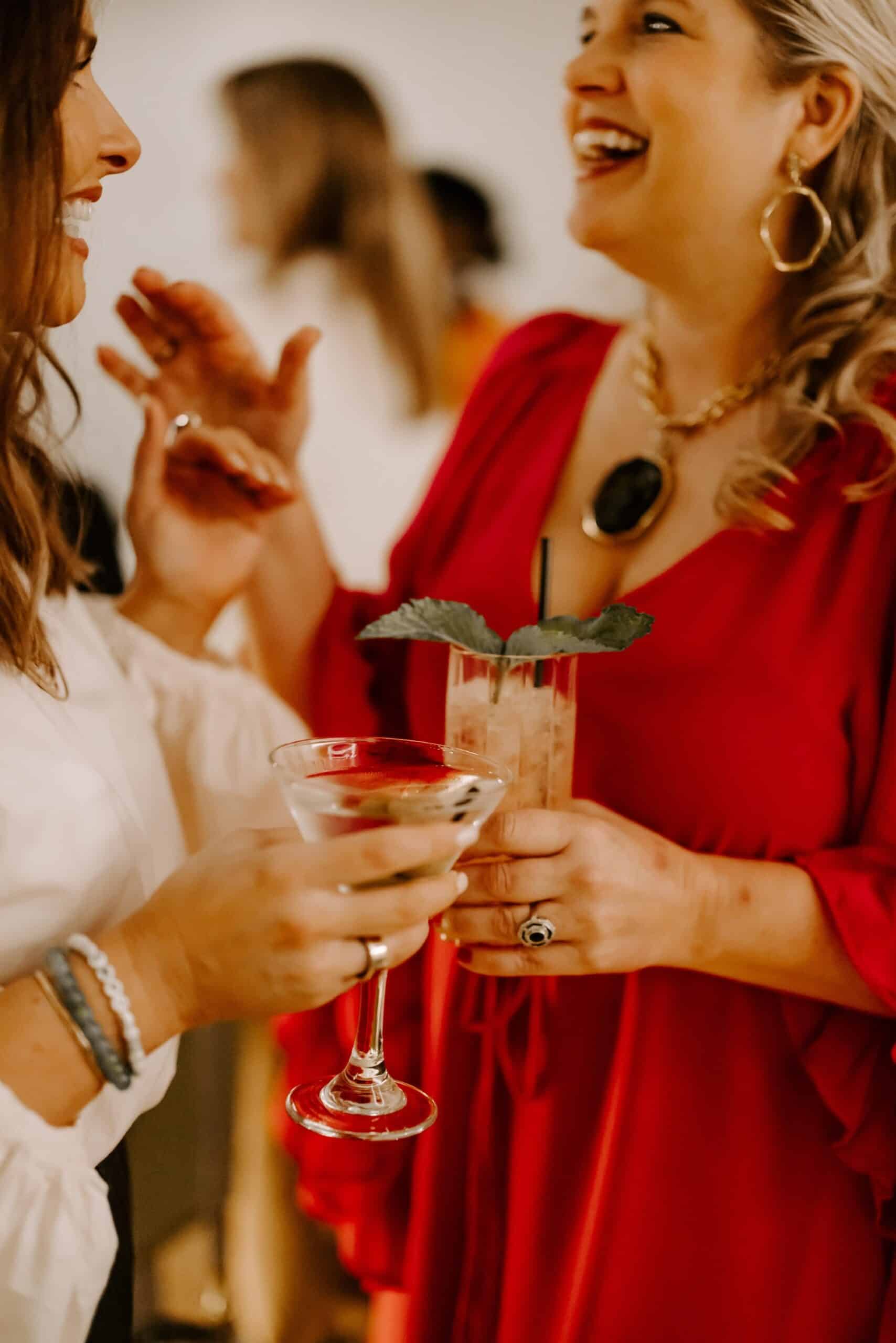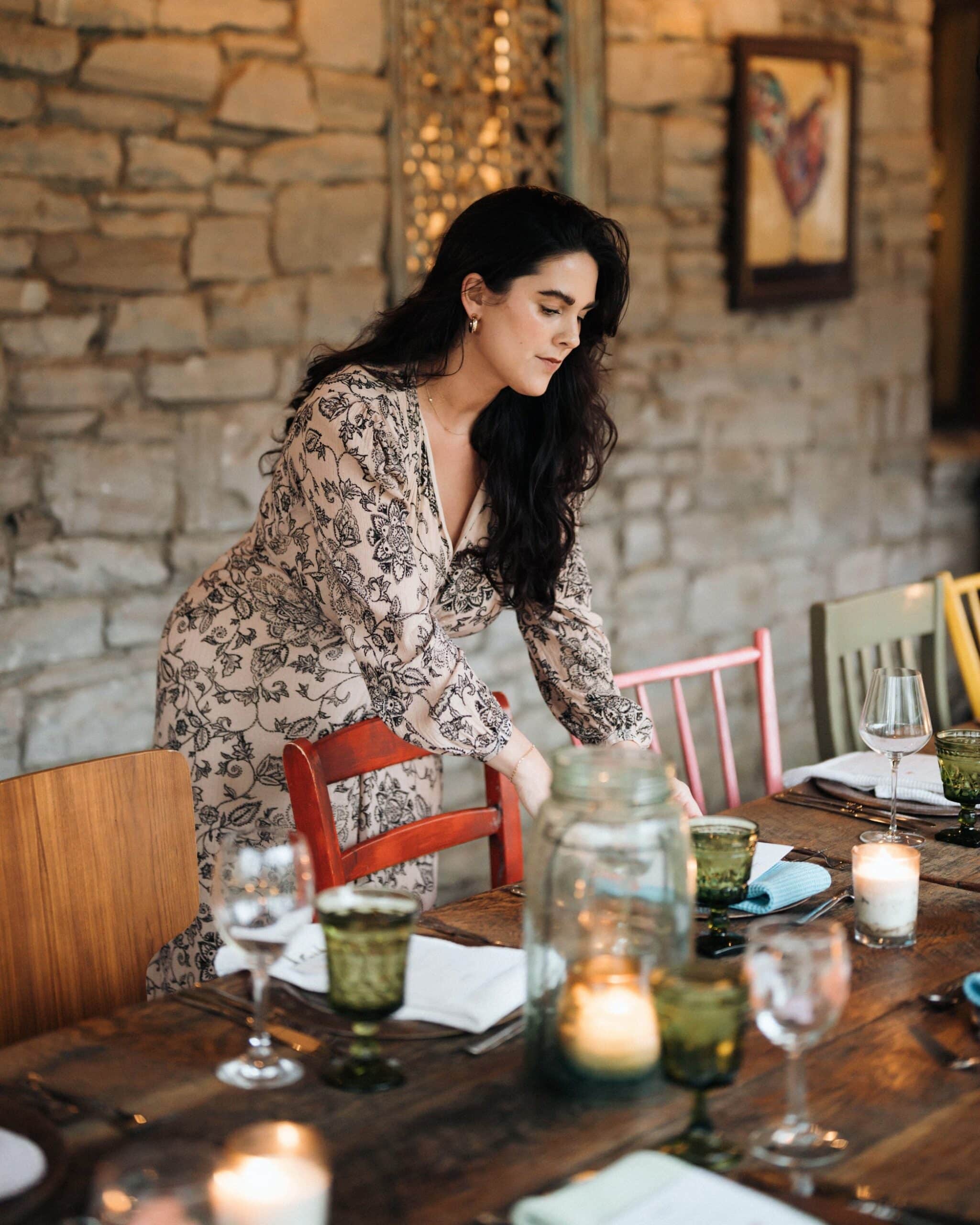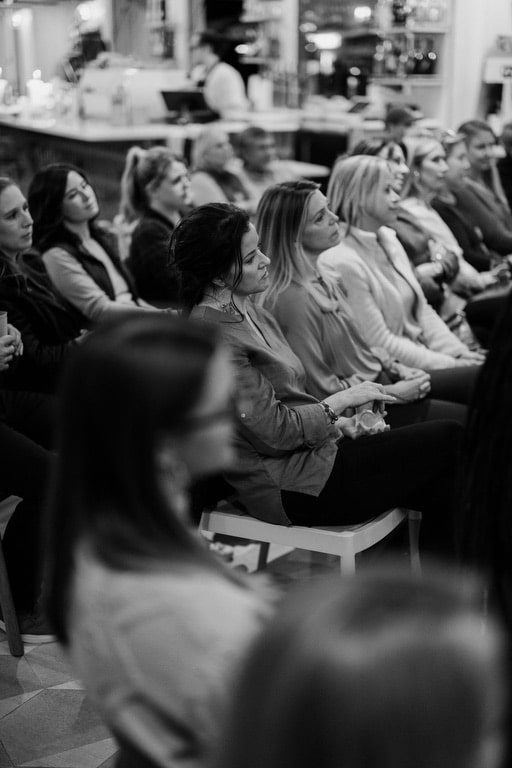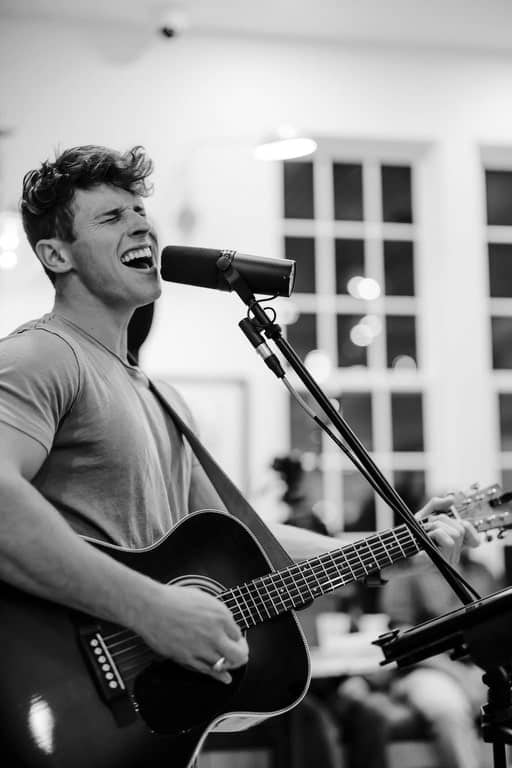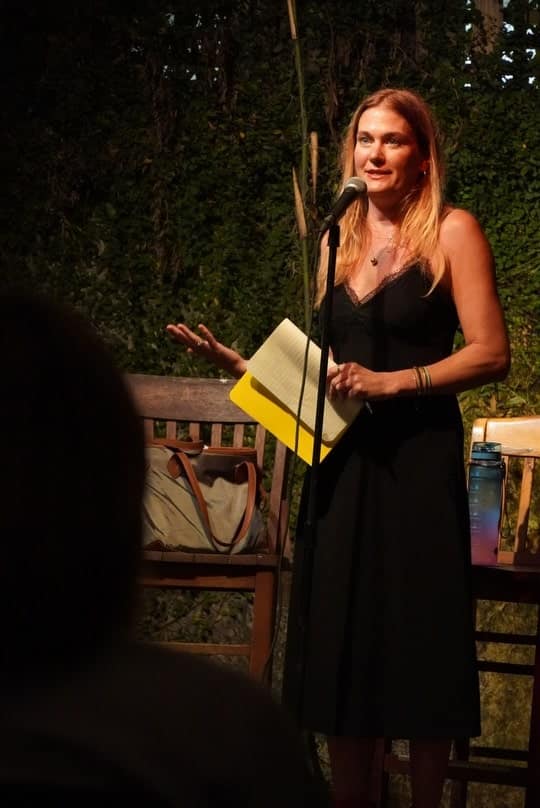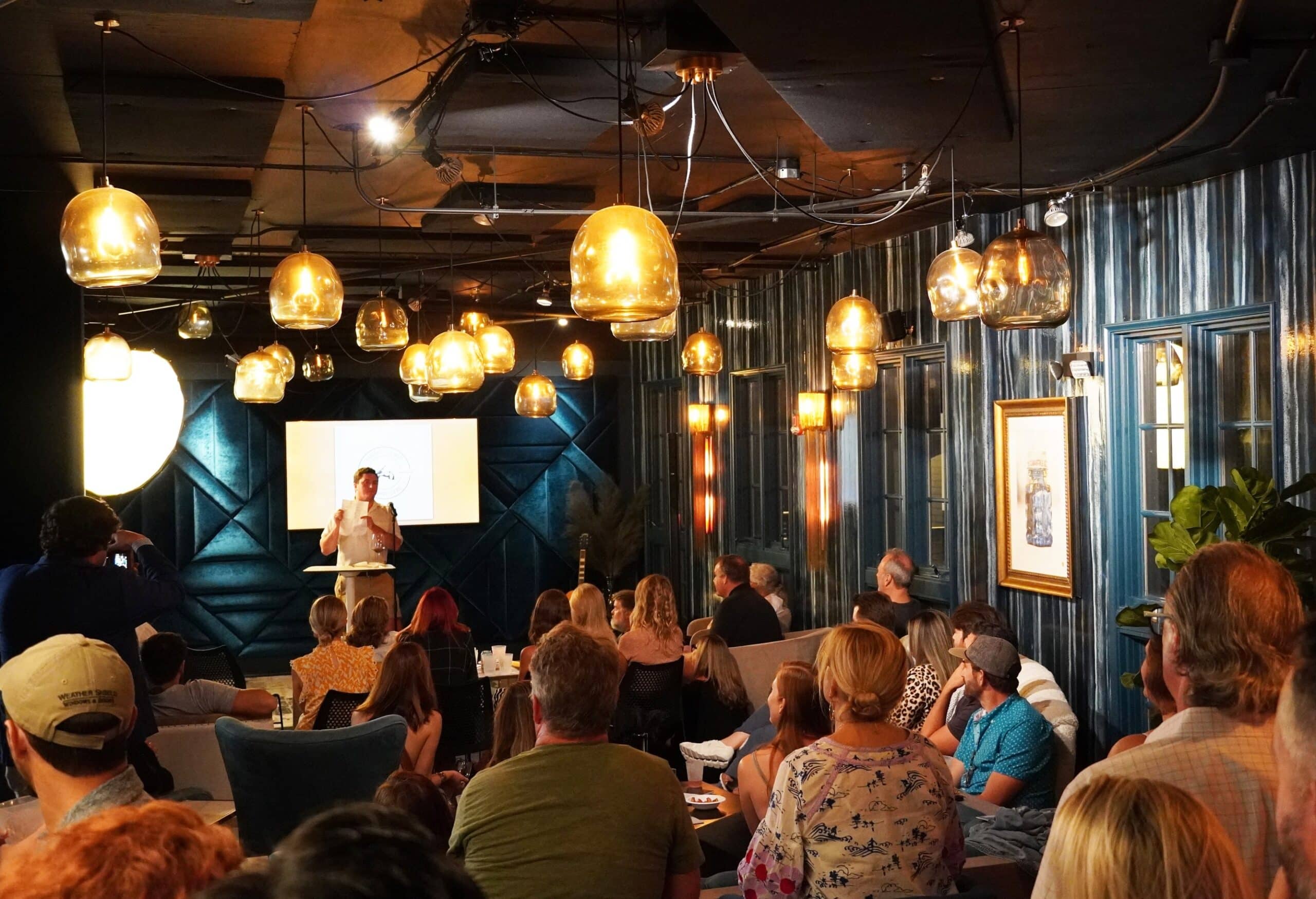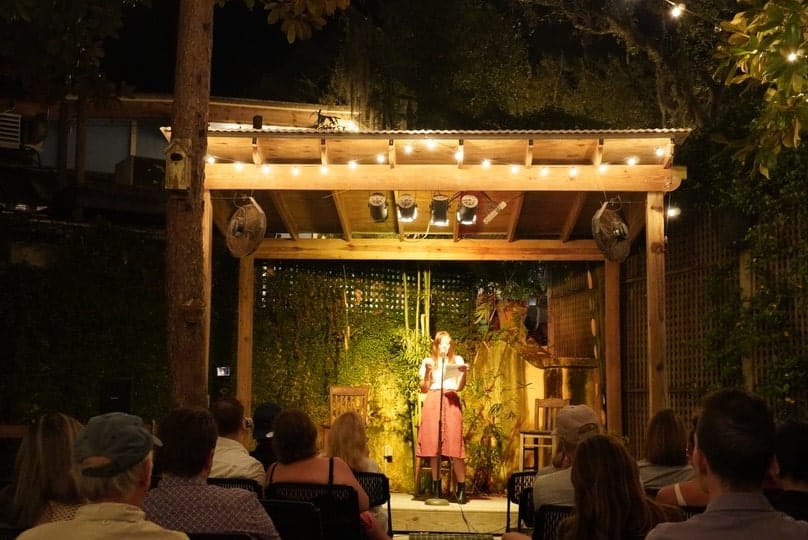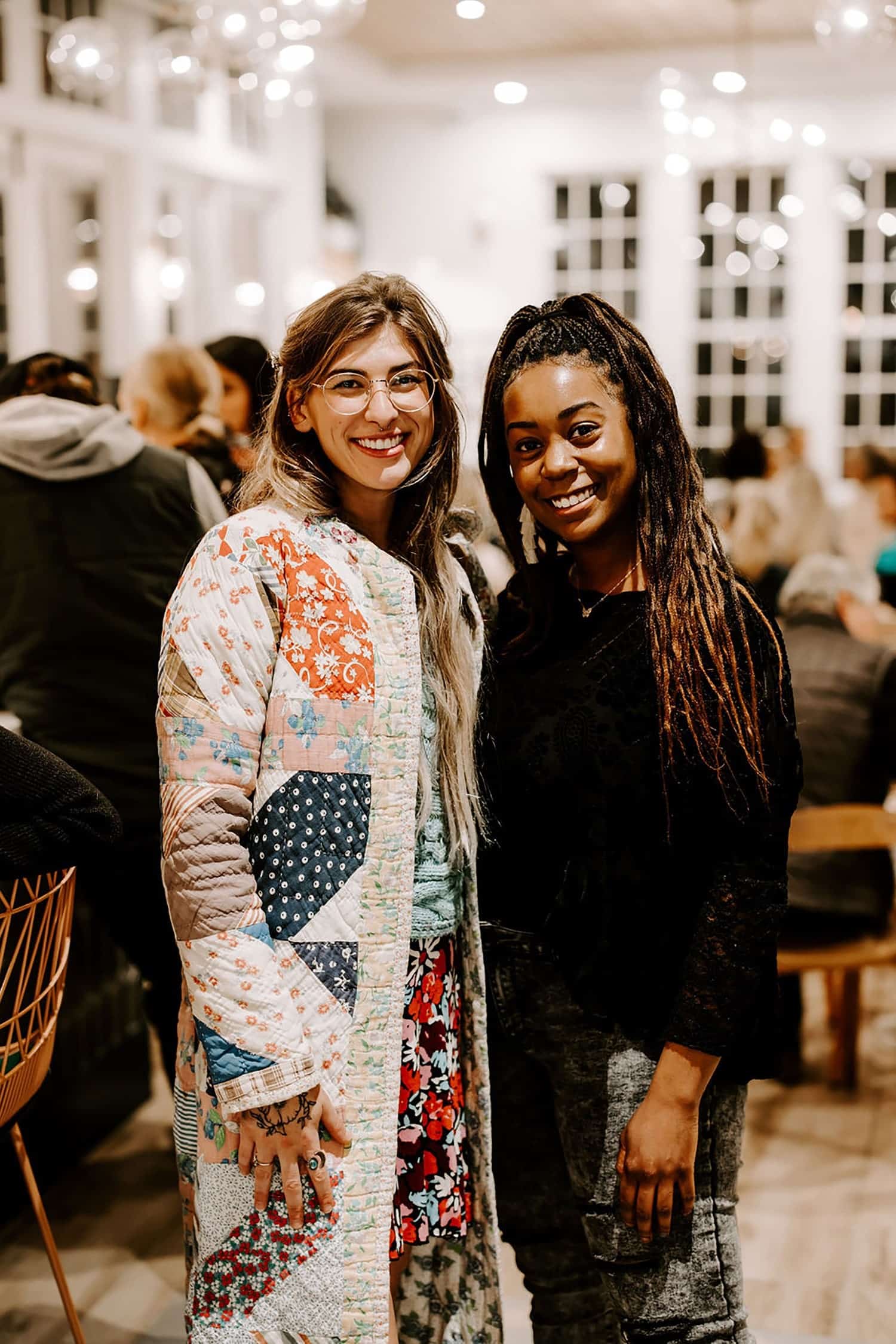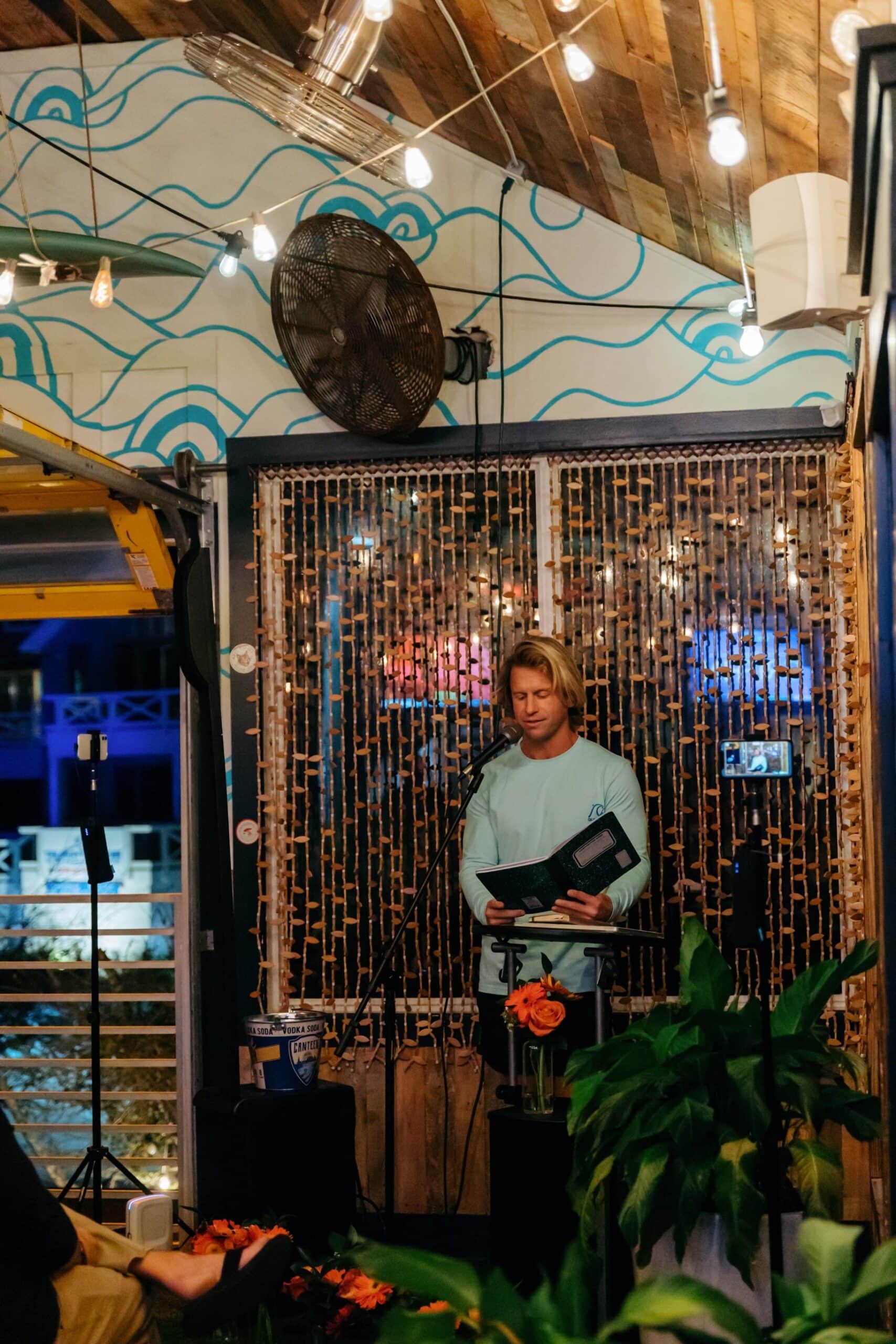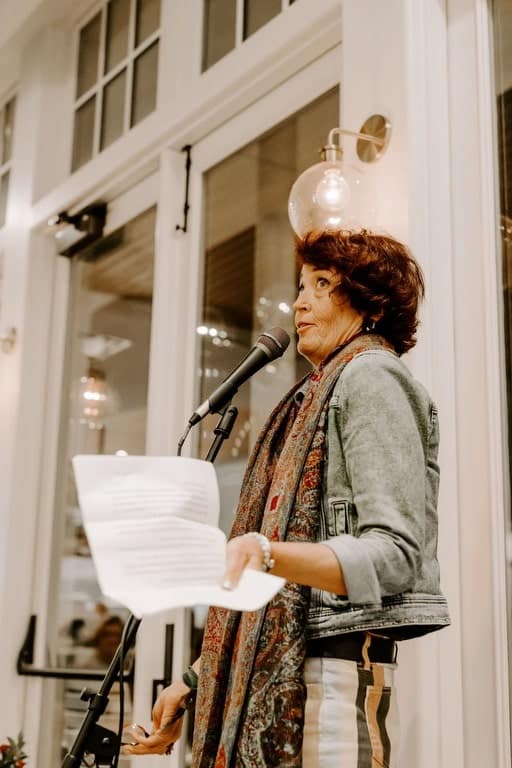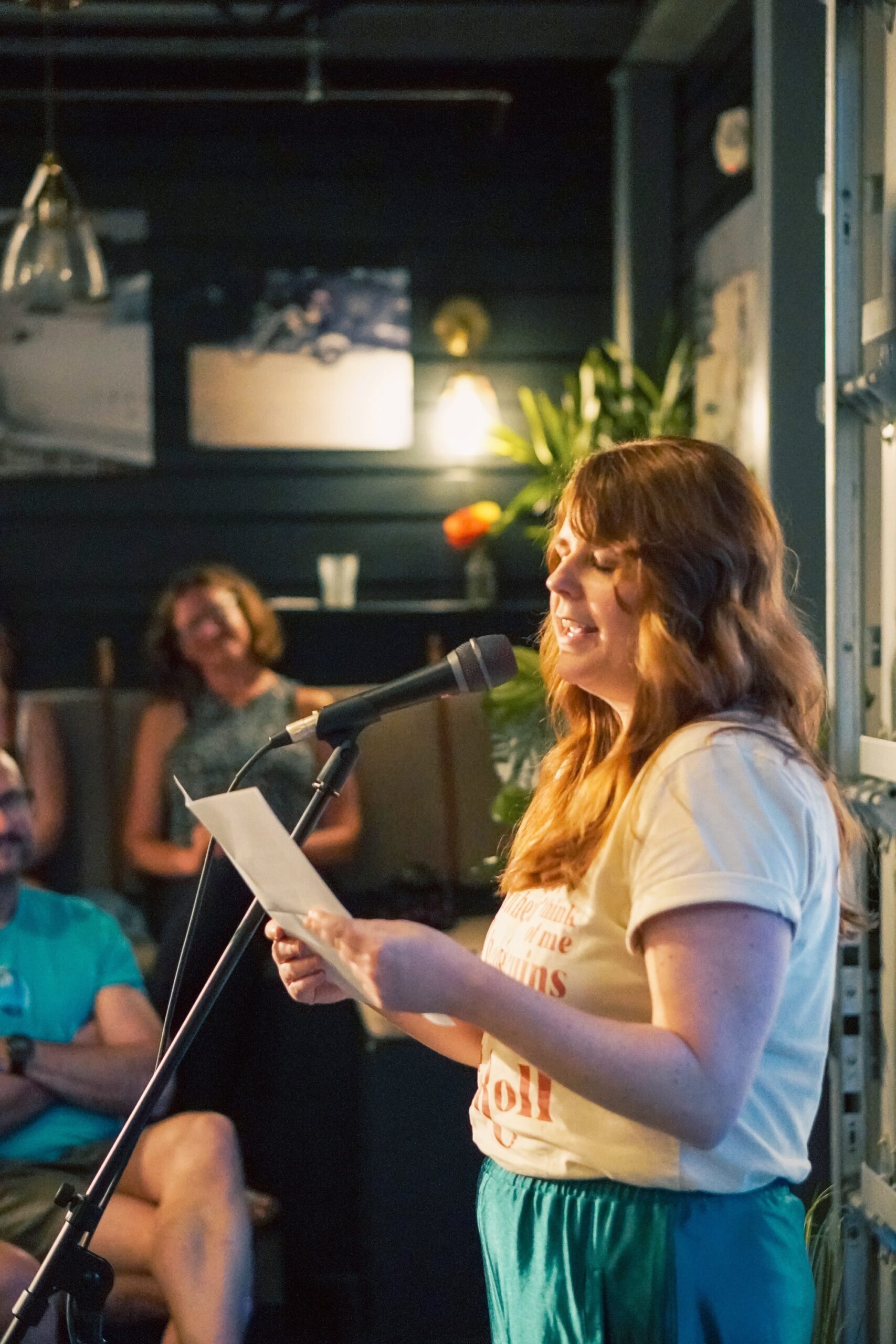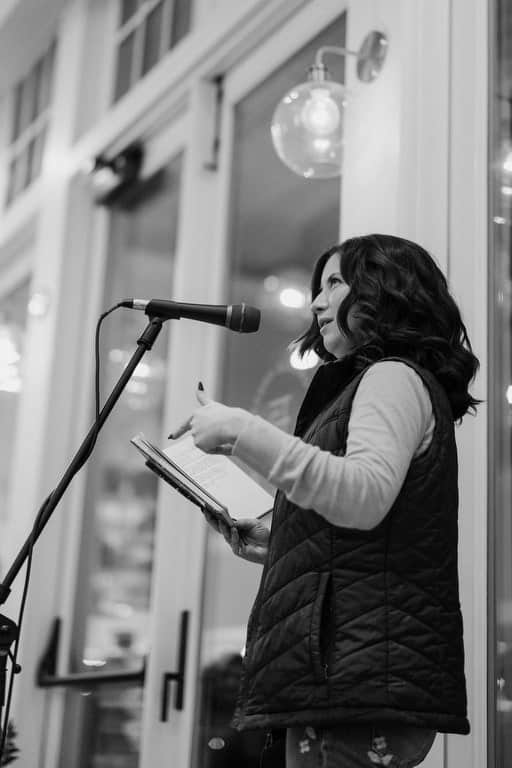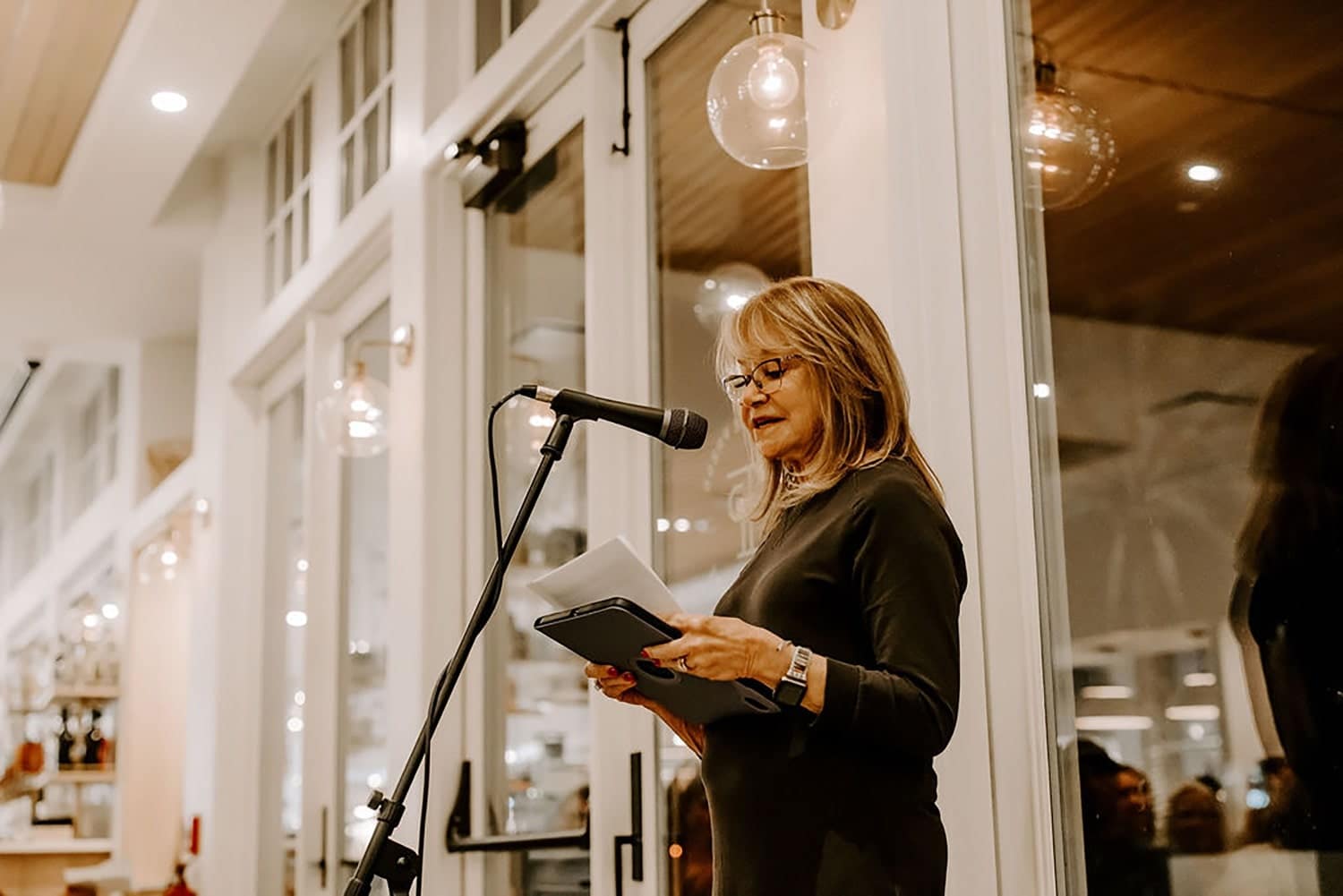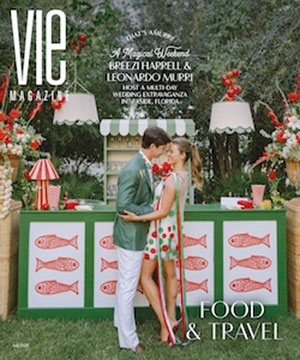
Photo_1-min
The Room Where It Happens
Emerald Coast Storytellers Take the Mic
By Jordan Staggs | Photography courtesy of Emerald Coast Storytellers
Since the most ancient civilizations, humans have had the innate desire to tell stories. Our spoken and written languages have become vehicles not only for communication but also for documenting history, entertaining, and creating connections with others. Music, poetry, and artful prose captivate the mind and evoke feelings like nothing else can. We all have a story to tell, and Emerald Coast Storytellers, based along the sparkling Gulf of Mexico in Northwest Florida, has created a platform for anyone to share their words with the community.
Coming up on its first anniversary in July 2023, Emerald Coast Storytellers (ECS) is the brainchild of close friends Kristy Holditch and Ali Diamond, two journalism majors who both grew up far across the US from the pristine white-sand beach community they now call home. Each month, ECS hosts a public After-Hours Writing Night for locals and visitors to join in-person or virtually, where writers are given a theme prompt for the evening and work on penciling everything from short stories to memoirs, poetry, and more. The theme of each month is carried over to a ticketed Open Mic Night, hosted at intimate venues across the Emerald Coast community, during which a dozen or so brave storytellers will take the spotlight for about five minutes each to share what they’ve written or, occasionally, tell a story on the fly.
As a fresh new cultural event concept in an area rife with some of the world’s finest music, art, and food festivals, ECS saw a tremendous response from the community right out of the gate. Storytellers of all ilks found a place to share their work, while fans of the written and spoken word flocked to hear them. Several have commented with pleasant surprise that they didn’t even know their neighbor or business colleague was into writing until they heard them take the mic at an ECS event. Although each Open Mic Night features an established storyteller as the guest of honor—authors, music producers, artists, and creative leaders alike have held that spot—the events are about creating connections among those passionate about telling stories, even if it is not their career focus. Part-time poets, moonlighting musicians, and aspiring novelists are more than welcome!
Fostering this type of community in an area so teeming with creativity is a dream come true for the ECS founders.
Diamond, who grew up and attended university in Madison, Wisconsin, echoes a story to which many ECS participants can relate. “I’ve been writing since I was a kid—short stories about cats, submitting my work to my middle school’s literary magazine, and entering poetry contests I found on the internet that were 100-percent scams. I love it. I’ve never wanted to do anything else.” She found her way to the Emerald Coast full-time after her parents bought a vacation home shortly before the COVID-19 pandemic. “There’s something special about this area. Whether it’s the weather, the beautiful beaches, or the kind individuals who call this community home, there’s something that calls to people who have great stories to tell. Maybe it’s the supportive entrepreneurial environment, the sheer inspiration in the sunrises, or maybe the feeling of magic, hidden just out of sight and nestled in the dunes.”
“I met my now-husband while I was living in Denver, and he had a dream of opening up the Emerald Coast area’s first vodka distillery,” says Holditch, who is from northern California and earned her degree in Colorado. “We started dating long-distance, and after just a couple of visits, I knew I didn’t want to leave here. There was just something about it. So from mountain girl at heart to born-again beach girl, I quite literally followed my heart to the beach. I swapped my skis for a paddleboard, and the rest was history. Moving from a bigger city, I think a small town like ours can feel limiting for some people. But it’s shown me what an incredible blank canvas it can offer to dream up anything and everything and make your mark, especially when it aligns with such an amazing community.” She also says that, like it is for Diamond, writing has been a constant thread, like a “silent pull,” in her life. “Somewhere along the way, I knew I wanted to create a career out of it. A minor in advertising paved the way for a marketing-by-day career path, but the dream quickly turned into wanting to become a full-time novelist.”
Twelve Months of Storytelling
The pair of young storytellers are excited to spread the news about Emerald Coast Storytellers’ One-Year Anniversary event coming up on July 14, 2023, at Emerald Coast Theatre Company.
“It’s exciting, to sum it up,” says Diamond. “It’s incredible that we’ve made it this far and that it has resonated with the community to the extent it has. Beyond our wildest imaginations, we hadn’t anticipated it would have grown into what it has today.”
People have come up to us after events and told us that we had created some kind of magic.
Knowing their first anniversary needed to be a momentous occasion, and thanks to a recent partnership with the Cultural Arts Alliance of Walton County, ECS plans to have its biggest Open Mic Night yet. “It’s going to be incredible,” Diamond shares. “Beachy Blooms is making custom floral arrangements. We’re bringing in Graze30a to do a grazing table, Bitterroot is donating delicious flatbreads for us, and Distillery 98 will provide craft vodka cocktails. It’s really going to be a showcase of local talent and a heartfelt thank you from us to the community. The theme for the evening will be ‘Milestones,’ which is perfect because this is such a huge one for us.”
Holditch adds, “Knowing this was going to be our biggest event yet, we wanted to host it with a place that not only had the space but also shared our passion for the arts. After attending their tenth-anniversary party last fall, it felt like a no-brainer to float the idea to Emerald Coast Theatre Company. They know how to transform a space and create the kind of magic where you get to leave reality behind for a bit. We can’t wait to celebrate how far we’ve come and hear local storytellers share triumph stories of their own.”
Flashbacks from Year One
Both founders agree that the year has flown by, and it’s humbling to see how far ECS has come in such a short time. Looking back, Diamond says, “Kristy and I always laugh about how, during our first open mic, we were apologizing for not having enough chairs because we ‘didn’t anticipate this many people coming.’ There were twenty to thirty people, but still! That was huge for us! We always want to keep providing something fun. Keeping an eye on the details and the clock while presenting something interesting is always a balancing act. But seeing our audience smile, laugh, or cry makes it worth it in the end.”
“People have come up to us after events and told us that we had created some kind of magic,” says Holditch. Diamond likens those magical little moments to a mosaic, saying, “When you put them together and light shines through, that’s when you feel the true beauty of this community.”
One of Holditch’s favorite ECS moments comes from one of their first Open Mic Nights at Distillery 98. “Sharing a story you’ve written can feel a bit like pulling your own heart out of your chest. It can be daunting and vulnerable, and when you add a room of strangers, the stakes feel even higher,” she explains (and I can attest to that firsthand). “There was a woman who had signed up to tell a story, and when we called her up to the mic, you could tell her nerves were getting the best of her—eyes low, shoulders hunched, paper shaking in her hands. When she began to speak, the first thing she said was, ‘Sorry, I’m super nervous. I’ve never done anything like this before.’ Then, out of nowhere, someone in the crowd called out, ‘You got this!’ The whole room broke out into a round of applause, followed by all this cheering and words of encouragement. As they did, the woman got the biggest smile on her face. She started laughing, and you could feel her nerves falling away from her. Her story was beautiful, and it was so cool to see the crowd rally behind her like that. I just remember thinking, ‘This; this is what it’s all about. Giving people a place where they can share a piece of themselves and have this much love, support, and connection on the receiving end.’ It was so special to witness and be a part of that.”
Another momentous ECS event was the organization’s first Story-Pairing Dinner, hosted at Hotel Effie in Sandestin Golf & Beach Resort in February 2023. This unique event combined the monthly Open Mic Night with a storytelling-inspired meal crafted by Chef Hugh Acheson. “Everyone loves a good wine-pairing dinner—we wanted a way to bring the story element into the mix and make it extra special,” explains Holditch. “Aside from the ancient art of storytelling, people have come together throughout history through breaking bread. This was the perfect way to bring the two together and do something that’s never been done before.”
Indeed, in their research, the ECS founders couldn’t find evidence of an event like this being held by any other organization or venue. “As far as we can tell, we’re the first to try such a thing,” Diamond says. There have been two Story-Pairing Dinners, with a third in the works. The second installment even took to the road, with ECS heading to Nashville, another creative town focusing on sharing stories, mostly through song.
Stories can be told in mediums far beyond the written and spoken word.
“They were beautiful,” Diamond says of the dinner series. “It was such a gamble, executing this brand-new event concept, but it truly paid off. The energy we created that first night; it felt different. It was like feeling the world tilt slightly off its axis. Hotel Effie, with its signature restaurant Ovide, was exciting and thrilling. Nashville, with Chef Johnny Haffner and Olive and Bee Creative, was utterly beautiful. It felt magical. It actually started raining toward the end, and where we were sitting on the back patio, you could hear the rain falling all around us. We are still confirming details for our Story-Pairing Dinner this fall, which will be in November at Henderson Beach Resort.”
The Next Chapter
Closing the first chapter of ECS only means there’s plenty more story left for all who have participated. Holditch and Diamond say year two will be bigger and better, with several new initiatives in the works and more that are mere plot babies in their minds. In addition to adding more Open Mic Nights and Story-Pairing Dinners, they plan to roll out a membership program to provide early access to event tickets, brand partnerships in the area, and more. A literary magazine is also in the works, where storytellers and artists can submit their work for inclusion. “The goal is to publish annually and make it an anthology of various storytellers in our community, which would allow an even bigger stage for them that goes well beyond our small beach town,” Holditch shares.
“We also want to provide more organic experiences for our members, whether that’s an invitation-only workshop with a poet laureate or a candlelit writing night at a local artist’s gallery,” says Diamond. “We want to keep creating beauty and authenticity in this community. I’d also love to incorporate a visual element into our event portfolio. We stress that we’re a storytelling organization. Stories can be told in mediums far beyond the written and spoken word. We’ve worked with music producers, authors, publishers, painters, and documentarians; they all have a story. They’re just told differently. We want to tell every single one.”
From here, the founders are focused on sustaining that authenticity while managing events in a measure of controlled growth—not to mention somehow carving out time for themselves to write, which was one of the initial catalysts for forming ECS. With Holditch and her husband, Harrison, having welcomed their baby girl into the world in late June as the storytelling organization celebrates its first year, it’s certainly a chapter of new beginnings and adventures.
“The doors that have opened for us in such a short amount of time have been so synchronous and such a nod to this incredible place and the people who live here,” she says. “From growing beyond the Emerald Coast to partnering with big-name authors, establishing a nonprofit that will help us instill the power of storytelling in new ways, and setting up our storytellers for publishing success and beyond, we can only hope it’s not a matter of if, but when.”
— V —
Tickets are on sale for the One-Year Anniversary Open Mic Night. Get yours, learn more about future events, and read past storyteller submissions at EmeraldCoastStorytellers.com or follow on Instagram @emeraldcoaststorytellers.
Celebrating the Written Word
We’re thrilled to share a few works from some of the writers who have taken the mic at Emerald Coast Storytellers events over the past year. ECS invites storytellers from the Northwest Florida coastal community and beyond to attend their monthly Open Mic Night, where around a dozen participants have the spotlight for about five minutes to read a story or share an anecdote. This is just a small sampling of the variety and talent guests have witnessed and shared through these momentous events!
“The Stoicism of a Tree”
By Milton Siegele
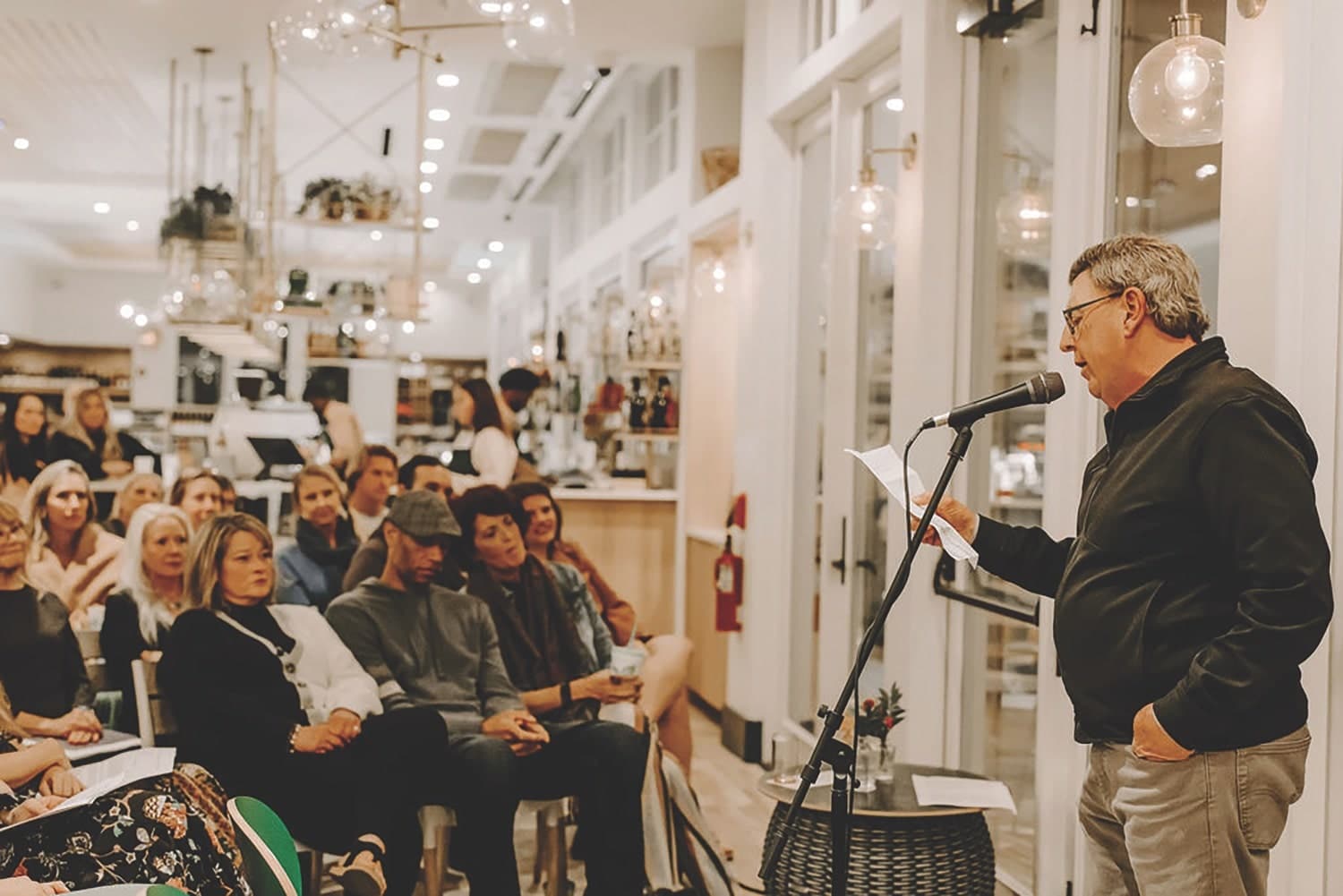
I have stood here enduringly for years.
I have patiently grown.
I have steadily gotten stronger.
I have steadfastly endured.
I have endured considerable pain and arduous hardship, but never, ever uttered a single word or shed a tear.
Because that’s what trees do.
They endure, dammit!
They endure!
And that may be the reason I exist, to endure, and to exemplify, in this one small space, what it means to endure, and how to endure, in stoic, silent strength, so that other trees might know.
After all, I am but a tree.
White People and Wonder Bread
By Lucinda Bunn
It all began when I performed my first episiotomy. On my mom. When I was born. With the silver spoon I had in my mouth. It was the dawning of the Age of Aquarius. The birth of the flower child. Phones were attached to walls, not people.
Kids played hopscotch and jumped rope on the sidewalks. Boys wooed girls with slicked-back hair and transistor radios. Girls wooed back with blue eyeshadow, pointed bras, and bright red lips. Wonder Bread was a staple in every home and a mustard seed in mine for my burgeoning romance with food.
To the world, we appeared to be the perfect family. Three white and shiny children, a celebrity father with movie-star good looks, a gorgeous mother who wore pearls and a smile made up of eighty-eight teeth.
My mother, Phyllis, was raised like the corn in Southern Illinois. She moved to the Big Apple to follow her career in journalism until she found her proper assignment as wife and homemaker to the family patriarch. She lived at the Barbizon Hotel for Women alongside others like Lauren Bacall.
She was working for ABC Sports when the man of her dreams and future nightmares walked into her elevator. The rest is part of my history. My father, stage-named Jimmy Blaine, was a beautiful man to listen to. His voice was our golden ticket.
We were living large in Larchmont, New York, home to the likes of Joan Rivers. It’s a small waterfront community, still today reminiscent of the age of the Great Gatsby. The Larchmont Yacht Club was our home away from home. Measuring up to the grandness of the Kennedy compound, it sat on a point in the Long Island Sound. It was there that sun, salt air, and being near the sea became staples of my well-being.
My mother basked in the sun with her reflector while my siblings learned to sail, and I learned to hate to swim and to love a good greasy burger off the grill. That paired nicely with a drink made up of everything from the soda fountain together. They called it a suicide, a beverage I would come to know well.
We presented well to the world, but I rarely felt safe in my home. The only nurture I recall came from the dogs, my father, or Emma, a woman of color paid to keep the house clean and the children loved.
One night while working in Manhattan in his late twenties, my father was mugged and left for dead in a stairwell. A fractured skull left him with two steel plates in his head, orders not to drink, and a life where grand mal seizures could come without warning.
Add to that the violence that comes with a wounded brain, coupled with an upbringing at the iron hand of a German father, and you get a war zone in my family living room. I loved my father. He was my best friend. We had a standing date on Saturday mornings to watch Sylvester and Tweety Bird in his big red leather chair. The one with the cracks in it that sat next to the smelly pipes on the table.
One day, my father was a no-show for our date. In his place came my mother and the family minister. “Your father has gone away in an airplane, and he’s not coming back,” was their message to me. The truth was that the night before, he went to bed, had a seizure, his heart stopped, and he died.
He was forty-two years old.
And there I was with a seven-year-old brain. Trying to make sense of words that weren’t true that were spoken by a guy in a God squad suit and the woman I was supposed to trust with my life and future.
The events of those twenty-four hours colored all of the five decades to follow. Who can I trust? God was a hard one. People in general. Men even more so.
Once my siblings were off to college, my mother made a wrong turn on the way to Ft. Lauderdale, landing us in Tulsa, Oklahoma. I quickly acclimated, finding my vines on the family tree, which were disordered eating, black-out drinking, and an ass-kicking depressive illness. I swung from one to another for a while and was able to let go of the alcoholism. Anorexia took a bit longer. At times, and against my will, the depression tangles up around my neck, typically in the winter.
Every bit of it was a blessing. Giving me a compassion for me and the lifetime of hard work I have put in to turn the generational tide of ill-being. And a knowing that when someone’s best sucks, it is due to unhealed parts in them.
Two years ago, once my twenty-four-year marriage was put to rest and my twenty-two-year-old kid was out of the nest, I brought myself back to my bliss. Left the confines of landlocked status and returned to the seaside on the emerald coast of the Gulf of Mexico.
The sun and the sea and all of the creatures in and around it are part of my tribe. I hang out with Walter the Pigeon on the beach. I say hi to the seagulls in the morning as they have their bad choir practice to see who can be the loudest.
I have come home to that seven-year-old little girl who was always meant to live by the sea.
And our new life together is just getting started.
Rom-Com Roots
By Jordan Staggs
Her mama had always said their family’s roots in the South ran as deep as the Mississippi. Still, Hendrix never had the heart to point out that the average depth of the Mighty Mississip’ was about nine feet and that the Congo, the Amazon, and the Nile all had it beat for the varying titles of “world’s best.” Nevertheless, the youngest daughter of the Cassidy family understood what her mother was getting at.
The family’s legacy might be more aptly equated to having roots as deep as the Appalachians, whose ancient, metamorphic layers run for miles underground, shaped by time and heat and water—especially the limestone. Its surfaces start to look more like the moon than Earth once the dripping, pooling, and running of rain takes the gentlest chisel to it over time.
Hendrix always loved the caves just a few miles from the Cassidy family estate in Tennessee, where she and her siblings and cousins played as kids, pretending to be pirates or explorers or dragons—whatever sparked their imagination that day. Sometimes the stories picked up where they left off from adventures the week before; other times, they morphed from medieval knights to moon landings in the course of an hour, and that was okay too.
It was the fairy tales that fueled her imagination the most, no matter how much her father had hoped giving her a name like Florence Hendrix Cassidy would produce a country music or rock and roll star, not a writer. The love of oldies and storytelling genes she got, but the vocal range, not so much. So, after college, Hendrix pulled up her Southern roots and dyed her natural blonde ones to a cinnamon red (both these decisions had her mama clutching her family-heirloom pearls). Then she did the unimaginable for any proper Southern belle: she moved to New York City.
She was thinking about those old caves and playing pirates and mermaids with her favorite cousins while squashed between two people on the subway. The not-so-gentle rocking of the train car was nothing like a pirate ship, and the white tiles coming into blurred view outside the window were nothing like caps on deep ocean waves, but she always had a knack for pretending things were something more than what they were.
“You’re a million miles away right now, aren’t you?” Beckett Barnes looked at her with clear amusement lighting up his hazel eyes. Beckett Barnes. A man destined for success, Hendrix thought. Even his name seemed practically made to have ‘best-selling author’ in print right beneath it. He was well on his way to that, too, if the things he’d read at the literary cohort where they’d met were any indication. In five months of attending workshops together, Beckett just got better and better, while Hendrix got stuck and stucker.
“I was looking for buried treasure,” she told him, shrugging in an offhand way that made the woman on her right shift in annoyance when their arms brushed a little too much, even for a crowded subway bench. Hendrix shot the lady an apologetic glance and leaned more into her—boyfriend? (the terms are still unclear)—on her left instead. She still hadn’t fully embraced how cramped people were on this island.
Beckett smiled, shaking his head at her as he set his hand on her knee. “Beneath Bleecker?” he asked, pretending to be appalled. “Hate to break it to you, Cassidy, but any buried treasure in these tunnels was claimed by the rats and the lizardfolk a long time ago.”
She shot him an unamused look as the train began screeching to its halt, and he stood before it even did that last, backward-moving lurch before the doors opened. Beckett didn’t even grab anything for balance; his designer sneakers were perfectly sturdy on the grunge-covered floor. That’s just how he was. Never thrown off. Easy, breezy, frustratingly charming, and talented to boot. He grew up in Manhattan, and although he was still there, he always gave the impression he could pick up and move at any time, could be just as affable in LA or London or Reykjavik, for crying out loud.
As far as Hendrix knew, the man had no roots holding him to this city. She supposed it was hard to put them down when the ground beneath you is concrete and even harder when no one’s around to make sure they grow. Now she wasn’t even sure it was possible for the guy to get attached to anything, let alone anyone. Despite her best efforts, not even the tiniest sprout of a root seemed to have formed these last few months, and she knew she was a poor gardener, but damn. This was a supremely stubborn plant if she ever saw one.
‘Are you referring to your not-boyfriend as a houseplant again?’ She could practically hear her roommate, Leia, criticizing her in her head. ‘The man is not a fiddle-leaf fig, Hendrix,’ she would probably say. ‘I’m begging you, get on a few dating apps like the rest of us and let Bestseller Barnes go and live his perfect, fairy-tale life alone, just like he wants to. Your time is too precious to waste on that.’
Leia could be harsh, but maybe she wasn’t totally wrong. Still, in this fictional conversation with her (very real but not currently present) roommate, Hendrix retorted, ‘Don’t you have a galaxy to go save?’
There was the problem, though, as plain as day in that hypothetical criticism inside her mind. The fairy-tale life. The unattainable root of every human’s insecurities over finding the perfect partner, living Happily Ever After, and all those Disney-hawked clichés. The most devastating part, Hendrix was painfully aware, was that for some people, it actually happens.
That was also the root of her writing problem lately. How does one avoid the tropes and the overdone fairy-tale romance in literature when it still seems to be what people dream about in real life? Was it such a bad thing to want to be swept off one’s feet? To feel those metaphorical fireworks during a first kiss? To hold hands when stepping off a subway car with the handsome, talented, fun guy who shares similar hobbies and interests?
Well, okay, Hendrix did get her wish on that last one. Beckett took her hand and laced their fingers together while they walked toward the exit of the steamy, noisy downtown station.
And maybe the rats and lizardfolk had pilfered the city’s maze-like caves clean of buried pirate treasure, but she could still swear not all the magic was lost during this underground expedition. If she wasn’t mistaken, it even seemed like the tendril of a root might be forming from Beckett’s palm as it pressed against her own, and she intended to help it grow.
“Please Refund My Pursuit of Happiness”
By Madison Shirley
What do you do when you have
Bought The Pursuit Of Happiness
But you can’t feel anything?
Not like a psychopathy
More like you have so heavily
Invested
In the concepts and things that were
Supposed to guide you through that journey
You are now
Broke. Broken. Broke.
The top ramen of tears doesn’t quite taste the same
When your emotional currency has run dry.
You bought it all, after all.
Why budget for yourself when the shopping
List was seemingly written in stone for you?
You got the life but forgot the spoons to serve it with.
Great grades. Good School.
Decent job with solid pay,
Awesome life, or so they say
Just follow this guide and your path will be made.
So why is it that this concrete path on your
pursuit of happiness that you have laid is
Cracked. Split. Broken.
Broken by numbness like
Rosemary in the cracks of
My mind.
Rosemary, mind you, which
Refuses to grow in
My garden, no matter what I try.
But these dark spines thrive in the
Mind.
Warping, twisting, in a way that leaves you
Always working
Weeding intrusive thoughts
Or nothing feels
Because otherwise, they overrun your perfect path
And you are trapped
Like in a hedge maze with nowhere to go.
That’s when a passing stranger might kindly shout through the dense brush:
“Have you just tried to pray it away?”
But you pray
Every Damn Day
Hoping to feel something, anything, anyways
Even pain.
Is there an emotional insurance you can cash in on?
Some safety net for an investment gone wrong?
Heck, burn it, drown it, tear it all down,
Even if it took the path, the pursuit, with it too.
At least I’d feel something. I’d take pain too.
But you’ve got nothing left, so you just let it
Grow.
It eats at your path, your plan, your pursuit,
Till there’s nothing but the bare ground beneath your feet,
And you’ve got nothing left to spend, to give,
So you sit in the numb haze of your maze,
While the life you purchased with your
Energy and time goes by.
Till the numbness becomes comfort,
Becomes safe and secure from the rushing life
You’d procured.
And where your pristine, perfect path once ran
Grows grass, mixed with sand,
Grows grass, mixed with sand,
Which is soft and gentle compared to the hard concrete
You had poured.
The straight and narrow path is gone, but the maze is for sure.
And you’ve bought this life it’s built on, so you might as well walk it.
The corridors of numbness take you way far off course,
Into pockets of your life you hadn’t thought to explore.
It’s denser in some spots, thinner in others,
So sunshine pokes through, and maybe some flowers
But in the quiet, dark spaces, you do something you haven’t
Done in a while
You think. And you think.
And then you breathe deep.
Then you realize that that path you were paving,
Concrete, firm, contrived,
Was never ending.
The mindless pursuit and presentation of this concept of happiness
Was fleeting. It does not exist at the END of a path,
It must be found in between sadness and sometimes malaise.
Laughter and dance are only sustainable bookended
By moments that are silent and still.
And you can see from your hedge
The stars only shine against the darkest of skies.
Now your maze is winding, twisting, and warping,
With uneven flooring and natural trappings.
It’s not easy, not comfortable, but the journey goes on
And the moments of joy are fleeting but strong.
But the deep rests you get in between as you walk in the shade
Are calming respites you find that you need.
A moment to reflect, reset, and
appreciate what you can feel.
While it’s not what you paid for,
it’s what you’ve got,
But somehow this maze offers quite a lot.
ORIGIN STORY: The Origin of US Travelers’ Bad Reputation
By Jennifer Howard
American travelers don’t have a stellar reputation overseas these days. And by Americans, I mean US citizens.
The “ugly American” trope of tacky tourists trying to speak another language by either speaking ever more loudly or mispronouncing English words with what they consider a local accent is one we all know well. These characters, or perhaps caricatures, seek out a McDonald’s as a first stop in a foreign country. They complain the beer is hot, the hotel rooms are small, and taxi drivers who don’t understand English are rude.
The inability to communicate, or communicate properly, in a foreign language could leave even those Americans who truly want to understand another culture guilty of perpetuating Americans’ poor reputation abroad. In fact, many travelers make a concerted effort to learn the language of the country they visit. Emboldened by hours on Duolingo and armed with Google Translate, they plunge right in, heedless of subject/verb agreement, proper pronoun gender, and local slang.
Yep, people like me.
It’s true: I have brought about grave misunderstandings and triggered multiple obscene hand gestures—and possibly a small diplomatic brouhaha—when making an effort to speak the language of a country I have visited.
Look, I am no dummy. I took Spanish 101 and 102 to satisfy my high school graduation requirements like most other citizens of our fifty states. Whatever Spanish I might have learned or recalled from Senhora Lopez’s fourth-period class was no help at all when I traveled to Brazil, where the dominant language is, unfortunately—at least unfortunately for me—Portuguese.
A few days after I arrived, I was thrilled to spot an open market in the park just outside the apartment where I was staying. Eager to prove that I could handle shopping for fruits and vegetables, foreign language be damned, I darted downstairs and into the busy market. Emboldened by my, um, strong Spanish-language background and the time spent on my iPhone on the flight south muttering after Duolingo, I plunged right in.
I managed to purchase some flowers—flores—without incident. But then I saw the mirlitons. To a native New Orleanian such as I, finding mirlitons is light-years better than any McDonald’s.
For those of you who don’t speak the mishmash of languages that form the lingua franca of the Crescent City, a mirliton is not a tall hat worn by hussars in the eighteenth century or a eunuch flute. Don’t believe everything Google tells you.
A mirliton is what some people call a chayote or alligator pear. It’s a mild squash-like vegetable, pale green and shaped like a pear. In New Orleans, the gushy interior is mixed with shrimp and seasonings to make a tasty, savory dish. By “tasty,” I mean high caloric. By “savory,” I mean spicy.
The vegetable stand where the mirlitons were piled in a meticulous geometric pyramid-type display was watched over by a largish man with a beard, wearing a stained white apron. He regarded me suspiciously as I walked to the front of his stand, beaming at the mirlitons. No doubt, I stood out in the crowd of uniformed housemaids and women sauntering in sheer bikini cover-ups. Or perhaps it was because I was clearly so excited over a vegetable. It’s difficult to say, what with cultural differences and such.
“Bom dia,” I said, with all the confidence of someone who knew at least fifty words in Portuguese. (That means good day.) So far, so good.
I was equally confident that I knew the word for mirliton. Out of the many helpful words and expressions I might have learned, I am not sure why I glommed on to mirliton. Food is important, right?
Smiling my best non-Ugly American smile, I said, “Eu quero xhi-xhi, favor.” I want mirliton, please. Not exactly fluency, but it should have gotten my message across.
The man behind the vegetable stand came out and started saying something very quickly that I didn’t have a prayer of understanding. Clearly, he didn’t understand me the first time.
I tried again. “Eu quero xhi-xhi, favor.” This time, to make sure he understood, I pointed to the carefully stacked pyramid of green mirlitons.
I wasn’t getting through. Maybe it was my accent. The vegetable stand proprietor raised his voice and started making motions that looked like he was trying to shoo me away. This wasn’t good. A few of the other shoppers had stopped and were watching.
At this point, I felt I really had to make an extra effort to bridge whatever cultural divide was causing this misunderstanding.
“Eu quero xhi-xhi, favor.” To make my point even more easily understood, I pointed to the precariously stacked vegetables. “Aqui.”
The reactions of the group of onlookers varied. Some laughed. Some laughed a lot. Others appeared angry.
The vegetable stand guy stuck with angry. His voice grew louder, vigorously making the point of whatever he was saying. He literally, although relatively gently, pushed me away from his stand. I stepped back, and he went back to the shooing motion.
I can take a hint. This was clearly a cultural misunderstanding I could not untangle. I tried my best to keep smiling as I wound back through the market toward my apartment building. Holding the flowers over my face helped.
A bit later, I knocked on my landlady Cecilia’s door. She was completely fluent in English, having apparently had a much stricter language education than I had. I recounted the situation at the open market to her and was dismayed when she, too, vacillated between a horrified expression and laughter.
“Oh my God,” she said. “The word is xhu-xhu, not xhi-xhi.” She was gasping with laughter.
“That’s not so different,” I defended my language-skill honor. “You’d think he would have figured out what I was saying.”
“Oh no,” she finally wound down from howling laughter to uncontrollable giggling. “Xhi-xhi means to urinate, only it’s a word a little child would use. Like pee-pee.
“You were telling him you wanted to pee-pee on his vegetables!”
— V —
Share This Story!
KEEP UP WITH THE LATEST STORIES FROM VIE



